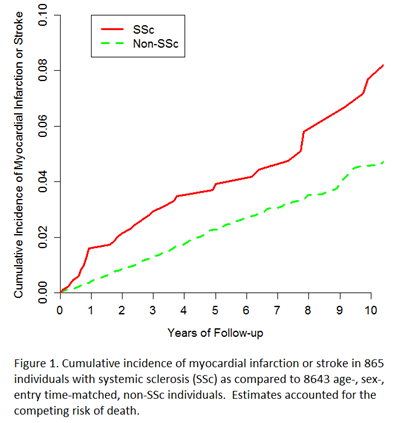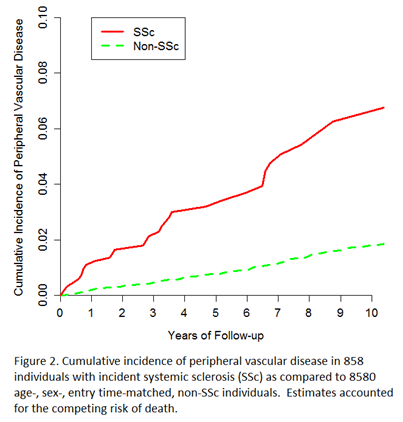Session Information
Session Type: Abstract Submissions (ACR)
Background/Purpose: Recent studies show that the prevalence of subclinical atherosclerosis is increased in individuals with systemic sclerosis (SSc). An accurate understanding of cardiovascular disease (CVD) risk is crucial in improving the overall outcomes of SSc, a disease associated with high mortality. To further elucidate the association between SSc and CVD, we evaluated the future risk of incident myocardial infarction (MI), stroke, and peripheral vascular disease (PVD) in individuals with SSc in a general population context.
Methods: We conducted a matched cohort study using The Health Improvement Network database, which is derived from electronic medical records from general practices in the UK from 1986 to 2011. SSc diagnoses, covariates, and cardiovascular outcomes were identified from the records. We conducted two cohort analyses: 1) MI and stroke, and 2) PVD, excluding individuals with prevalent disease from each analysis. PVD specifying the upper extremities was not included. We estimated hazard ratios (HRs) using Cox proportional hazards regression models, comparing SSc with age-, sex-, and entry time-matched comparison cohorts, adjusting for BMI, smoking, diabetes, hyperlipidemia, hypertension, atrial fibrillation, aspirin, oral glucocorticoid, and NSAID use. We then estimated the cumulative incidence of each outcome accounting for the competing risk of death.
Results: Mean follow-up time was 5.2 years in the SSc cohorts and 6.0 years in the comparison cohorts. Among 865 individuals with SSc (85.8% female, mean age 58.7 years), the incidence rates (IRs) of MI and stroke were 4.4 and 4.8 per 1000 person-years (PY), versus 2.5 and 2.5 per 1000 PY in the comparison cohort, respectively. The corresponding adjusted HRs were 1.80 (95% CI 1.07 to 3.05) for MI and 2.61 (95% CI 1.54 to 4.44) for stroke. Among 858 individuals with SSc (85.3% female, mean age 58.9 years), the IR of PVD was 7.6 per 1000 PY versus 1.9 per 1000 PY in the comparison cohort, with an adjusted HR of 4.35 (95% CI 2.74 to 6.93).
Conclusion: These findings provide the first general population-based evidence that SSc is associated with an increased risk of developing MI, stroke, and PVD. Increased awareness of CVD in individuals with SSc is warranted. Further insight into the etiology of CVD in SSc, including the relative contributions of microvascular and macrovascular pathology, as well as how anti-platelet or vasodilating medications may alter this pathology, is needed.
Disclosure:
A. Man,
None;
Y. Zhu,
None;
Y. Zhang,
None;
M. Dubreuil,
None;
Y. H. Rho,
None;
C. Peloquin,
None;
R. W. Simms,
None;
H. K. Choi,
None.
« Back to 2012 ACR/ARHP Annual Meeting
ACR Meeting Abstracts - https://acrabstracts.org/abstract/the-risk-of-cardiovascular-disease-in-systemic-sclerosis-a-population-based-cohort-study/


